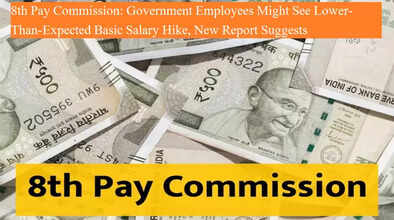8th Pay Commission: Government Employees Might See Lower-Than-Expected Basic Salary Hike, New Report Suggests

8th Pay Commission Shocker: Basic Salary May Rise to Only ₹30,000, Not ₹51,000 as Expected – Report Reveals
A major development regarding the 8th Pay Commission has emerged, potentially disappointing nearly 50 lakh central government employees and 65 lakh pensioners. Contrary to earlier expectations that the minimum basic salary might be revised from ₹18,000 to a generous ₹51,000 per month, a fresh report by Kotak Institutional Equities suggests that the hike could be far more modest.
As per the latest analysis, the basic pay under the 8th Pay Commission could be revised to ₹30,000, based on a proposed fitment factor of 1.8. This falls significantly short of the anticipated threefold increase that had created a buzz among government employees and stakeholders.
What Is the Fitment Factor?
The fitment factor is a multiplier used to revise salaries from the current pay structure to the new one under a pay commission. For instance, in the 7th Pay Commission, a fitment factor of 2.57 was used, significantly boosting salaries across levels. In contrast, the suggested 1.8 factor under the 8th Pay Commission would result in a smaller raise.
If this is implemented, the minimum basic pay would increase from the existing ₹18,000 to ₹30,000 per month, which is approximately a 13% salary hike on average—well below employee expectations. This revelation has already sparked disappointment among many who had hoped for a more substantial pay bump.
Why the Delay in Implementation?
Although the 8th Pay Commission was announced by the Indian government in January 2025, progress remains slow. As of now, Terms of Reference (ToR) have not been finalized, nor have the commission members been appointed. Kotak's report estimates that it may take 18 months for the commission to prepare and submit its recommendations. After that, the government may take another 3 to 9 months to review and implement the proposals. This pushes the expected implementation timeline to late 2026 or early 2027.
Impact on Government Expenditure
Implementing the 8th Pay Commission is expected to be a significant financial undertaking. According to Kotak, the hike could cost the government an additional ₹2.4 to ₹3.2 lakh crore, translating to about 0.6% to 0.8% of India’s GDP. The largest beneficiaries of this move will be Grade C employees, who comprise nearly 90% of the central government workforce.
Economic Ripple Effect: More Spending and Saving
Historically, pay commissions have led to a surge in demand for consumer goods, automobiles, and household products, driving growth in FMCG and auto sectors. This time too, a similar trend is expected. Additionally, the report suggests that an estimated ₹1 lakh to ₹1.5 lakh crore in additional savings could be redirected toward bank deposits, stock markets, and physical assets like gold and real estate.
What the Finance Ministry Says
On July 21, 2025, Minister of State for Finance Pankaj Chaudhary confirmed in Parliament that work on the 8th Pay Commission has begun. The government has started seeking inputs from various ministries, including Defence, Home Affairs, and the Department of Personnel and Training, as well as from state governments.
He also clarified that the commission’s recommendations will be implemented only after formal approval from the central government, following the completion of its study.
A Decade-Old Routine
India typically sets up a Pay Commission every ten years to revise salaries and pensions in line with inflation and rising living costs. The 7th Pay Commission, the last one to be implemented, came into effect in 2016.
Final Thoughts
While the 8th Pay Commission does promise relief for government employees, the extent of the benefit might be more limited than many anticipated. As the government finalizes its roadmap, employees across India will be watching closely, hoping for a more favorable revision when the final numbers are announced.

